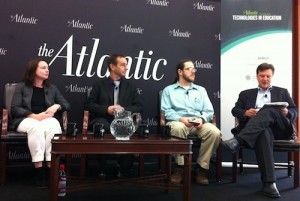 Still buzzing from the exciting events of the previous evening, many participants from the STEM Video Game Challenge‘s Celebration of Success attended The Atlantic’s second annual Technologies in Education Forum on May 22 in Washington, D.C. The Forum continued a lively discussion around the role that games play in STEM learning, with editorial staff from The Atlantic asking probing (often skeptical) questions and speakers generally offering optimistic answers.
Still buzzing from the exciting events of the previous evening, many participants from the STEM Video Game Challenge‘s Celebration of Success attended The Atlantic’s second annual Technologies in Education Forum on May 22 in Washington, D.C. The Forum continued a lively discussion around the role that games play in STEM learning, with editorial staff from The Atlantic asking probing (often skeptical) questions and speakers generally offering optimistic answers.
A panel on “Framing the Role Games Will Play in Future Learning” addressed whether there is a danger that children will expect the real world to engage them as games do. Robert Torres of the Bill and Melinda Gates Foundation described mastery as the nexus of high engagement and high cognitive demand (and the ability of games to provide both), while Sandra Calvert from the Children’s Digital Media Center emphasized the continued need for face-to-face interactions between teachers and students.
Our colleague Jessica Millstone contributed to a strong panel discussion on the role teachers will play in game-based learning, citing her recent survey and the work of fellow panelist Joel Levin. Joel explained how Minecraft–a commercially successful game–can be repackaged for classroom use, and noted teachers’ roles in providing context and direction to help students learn the most from games.

From left: Jessica Millstone, Alexander Reppening, Joel Levin, and Clive Crook. Photo by Michelle Miller.
Discussing how educational technology will train future workers for next wave jobs, Andrea Taylor from Microsoft shared a whopping statistic: there are 5,000 high-paying, open positions at her company due to a lack of applicants skilled in STEM. Larry Irving, founder of the Internet Innovation Alliance, said that policy makers and others in the academic sphere should be more in touch with real users in diverse communities and more open-minded about unconventional solutions to bridging the divide. A recurring theme was the concern that digital opportunities for some could cause those already at a disadvantage to fall further behind. Questions about gender, income level and children with disabilities peppered discussions through the day.
Joel Klein, EVP of News Corporation and Former Chancellor of the NYC Department of Education, gave spirited remarks about changes in “the game” over the next three to five years. But from my very biased perspective, the event came alive during the presentation of our STEM Video Game Challenge winners. A few of the youth winners were on hand to receive a boisterous round of applause from a room full of VIPs, and winners from the Educator and Collegiate categories received their $10,000 checks and the opportunity to demonstrate their games. As many in the audience pointed out, those students and educators are really what it’s all about.
View video of the “Stand and Deliver: The Role Teachers Will Play in Game-Based Learning” panel below. View the rest of the day’s discussions on The Atlantic Live website.




